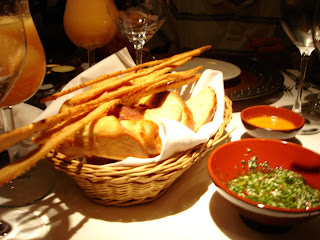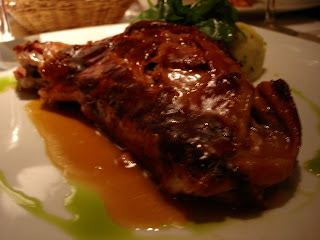 Lucques
Lucques8474 Melrose Ave
West Los Angeles, 90064
$124 for two entrees, two appetizers, wine, cocktail and tea
Taking a break from my Peruventures, I thought I would share my thoughts on my dinner at Lucques. Alas, I could not make the famous Sunday Supper reservations, but I was able to grab an 8:15 on Monday night. It seems every major publication in the area gave glowing reviews for Lucques including S. Irene Virbilla of the LA Times and Jonathan Gold of LA Weekly, not to mention being ranked as the best restaurant in LA by LA Magazine. That said, I'd have to add my own blog to that list of Lucques reviewers.

Bread offering with almonds and olives
The atmosphere was quaint, as you'd expect from a restaurant set in the converted cottage of silent movie star Harold Lloyd. Wooden rafters give way to brick siding and open out to a small patio. In LA, there's hardly ever a restaurant that doesn't take full advantage of the beautiful evening weather with outdoor seating. The space wasn't large, but it conveyed elegance in intimacy. A group of slightly inebriated women chatted in a corner with a tall bottle of red wine, a clumsy suitor chatted nervously with his date nearby and what looked like a sugar daddy was showering his little ward with gifts of wines and desserts. Whatever the social circumstances, Lucques seemed to provide an appropriate backdrop.

Market lettuces with green goddess dressing, ruby grapefruit, avocado
The restaurant features one of those constantly updating menus depending on the seasons and availability of ingredients. It's also one of those menus which I could blindly point at and still be completely satisfied. Supposedly, the cuisine is Mediterranean-inspired but channeled through a Californian focus. Elements of Greek, Spanish and Italian dotted the menu, but the most prominent feature was the variety of ingredients. Indeed, with the dishes I tasted, I could sense the deep appreciation that Chef Goin has for the foods she works with. She allows each flavor to trumpet its own horn, whether the sweetness of the grapefruit or the tartness of the citrus dressing of the salad. Her expertise is not only limited to produce, but the delightful lamb carpaccio also showed a great respect for meat. The crispy fried fingerling potatoes and the creamy scallion aioli paired so nicely with the tender lamb that each forkful blended with complexity. The flavors are good enough separately, but combined they were heavenly. It reminded me of the scene from Ratatoutille where Remy describes to his brother how combining notes can create whole new chords of aroma and flavor.
And that was just the appetizers.

Slow-roasted Veal
The two entrees I tried, the slow-roasted veal with potato gratin and the crispy pork belly with peaches were hearty. So hearty in fact, the food doesn't look that exquisite. There wasn't the excessively large plate with a dainty morsel in the center with a single chive resting on its side. No, this was the food you wanted to see when you're hungry. Unfortunately, I had filled up quite a bit on the bread and appetizers already and seeing my pork belly made me somewhat anxious. While I would gladly order pork belly again as an appetizer, having a full serving as an entree is just too much. The pork had contrasting textures of the crisp skin and the tender fat that made eating it so interesting. But it was that fat, combined with a sauce heavy on the butter, that was simply too much for me. It was actually one of those moments where I could feel my life shortening. But who wants to live a life without food like this?
That night I knew precisely why Lucques received all those accolades. It reached out to an LA that was hungry. Hungry not for large portions, but food you eat when you really want to enjoy your food. Sometimes we get so caught up in experimental cuisine, where it's often more of a test for your brain than your stomach, that it's easy to miss the food that just makes us say, "Yum!"


































